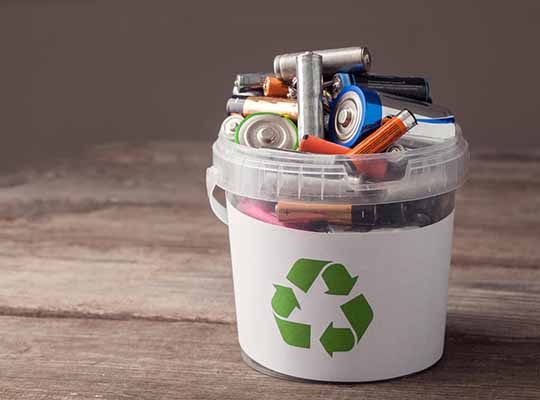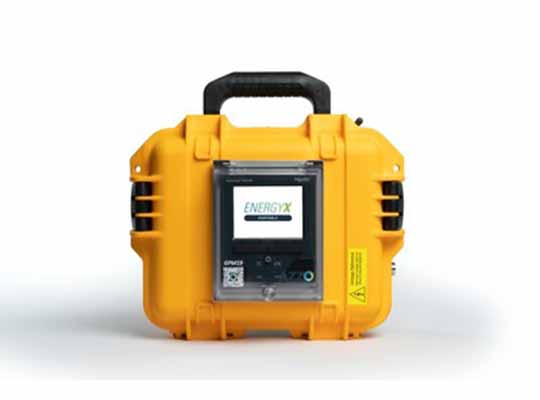TES, one of the world’s largest providers of sustainable technology lifecycle services, has announced it has agreed to a deal that secures the future of a 10,000 square metre (approx. 110,000 sq. feet) recycling facility in the Port Of Rotterdam, Europe’s largest seaport.
The facility, strategically located adjoining to the waterways of the port of Rotterdam and with an option to extend onto a neighbouring plot that will increase the site to over 40,000 square metres (approx. 430,000 sq. ft), already has a basic waste license to receive, store and forward lithium batteries and to manage electric vehicle batteries and battery production scrap as well as a permission to shred alkaline batteries.
The site extension is planned to be fully operational by late 2022 and will be the first lithium battery recycling plant in the Netherlands, complimenting the two other TES lithium battery recycling facilities in Grenoble (France) and Singapore.
The TES site in Grenoble was one of the first recycling sites to use an inert shredding process that safely crushes lithium batteries and developed a number of key patents for hydrometallurgical processes.
The expertise gained in France played a key role in TES opening Southeast Asia’s first lithium battery recycling facility in Singapore in March 2021. This state-of-the-art facility has the daily capacity to recycle up to 14 tonnes of lithium batteries — the equivalent of 280,000 smartphone batteries.
These existing facilities will support the development of the new, larger-scale site in the Port of Rotterdam. The combined capacities of the three facilities will make TES one of the largest service providers of lithium battery recycling globally as well as one of the largest generators of commodity materials produced from the battery recycling process.
This deal is part of an ongoing commitment from TES to improve the collection and recycling of portable and industrial batteries in Europe and supports the European Union’s goals laid out in the European Green Deal.
It is also a strategic move in preparation for the huge rise in global demand for lithium batteries as car manufacturers increase their electric vehicle outputs — which are predicted to increase 14-fold by 2030 (compared to 2018 levels).
A report from Circular Energy Storage1 in December 2020 explained that Europe is currently under capacity for sustainable lithium battery recycling, and more capacity is needed to meet waste generation by 2030.
According to figures from the European Commission2, the EU could account for 17% of the global demand for lithium batteries by 2030, the second highest share worldwide.
Thomas Holberg, Global Vice President of Battery Operations at TES commented, “We have a vision to be a global sustainability innovator, and our unwavering ambition to turn the Port of Rotterdam site into a state-of-the-art European battery recycling facility is key in delivering that strategy. Once up and running, we will have up to 10,000 tonnes of shredding capacity per year and a subsequent hydrometallurgical process which focuses on the recovery of nickel, cobalt, and lithium as a precursor feedstock for the battery industry.”
In response to rising demand, the European Commission has proposed modernising EU legislation on batteries as part of its Circular Economy Action Plan3. This includes goals for batteries that are more sustainable throughout their entire life cycle — which is key for the European Green Deal and will donate to the EU’s zero pollution ambition.
Jean-Christophe Marti, Senior Partner and CEO at Navis Capital Partners, added, “With this investment, TES deepens its commitment to a global network of sustainable battery recycling offerings that addresses the challenges around the lifecycle while positioning TES as a trusted partner in closing the loop for our customer’s battery supply chain.”
Securing the future of this facility is welcomed by the Port of Rotterdam and is another example of their continued focus on supporting the development of circular industries within the port.
Allard Castelein, CEO at the Port of Rotterdam, commented, “We are working not only towards a net zero CO2 emission port and industry in 2050 but also looking at ways to make the industry more circular. Therefore, besides working on projects regarding, for instance, hydrogen and carbon capture and storage, it is important to take significant steps to establish circular production processes. The TES project in Rotterdam is exactly that. This could very well become the largest European facility for recycling batteries from electric cars.”
Holberg concludes, “Our mission at TES is to ‘close the loop’ on lithium battery production by encouraging reuse and improving the collection and recycling of the scarce metals and materials they contain. Our commitment to this facility in the Port of Rotterdam is a clear indication that we are choosing to invest in our future now and to increase capacity in the European battery recycling supply chain.”
Notes to Editors
- The European Green Deal sets out goals for 2030 onwards to significantly improve the recycled content of scarce metals like nickel, cobalt and lithium in industrial and electric- vehicle batteries.
- As of 01 January 2027, industrial and electric-vehicle batteries with internal storage will have to declare the content of recycled cobalt, lead, lithium and nickel they contain.
- From 01 January 2030, these batteries will have to contain minimum levels of recycled content (12% cobalt, 85% lead, 4% lithium and 4% nickel).
- From 01 January 2035, these levels will be further increased (20% cobalt, 10% lithium and 12% nickel).
Fast Facts:
- TES owns and operates 42 facilities worldwide in 21 countries, which, in 2020 alone, processed over 108,000 metric tonnes of electronic material, with a reuse, recycling and recovery rate of 96.9%.
- In the next 10 years, the battery demand due to electric vehicles will increase tenfold, up to 2,333 GWh.
- By 2030, 215 to 300 million electric vehicles (EVs) will be on the road. By 2040, this number is expected to increase to 900 million.
- Global demand for batteries is set to increase 14-fold by 2030 (compared to 2018 levels), mostly driven by electric transport.
- TES officially took over the assets, employees, the site and its permit on 15 June 2021 from Battery Recycling Services Netherlands. The recycling site is on a 10,000 sqm property in the Port of Rotterdam and has an extension space of 30,000 sqm.
- TES intends to reinstate the business and will begin plans for a capacity extension on the neighbouring 30,000 sqm plot for a recycling and repurposing centre for lithium batteries.
- In March 2021, TES opened a multimillion-dollar, state-of-the-art facility in Singapore to cover Southeast Asia. The facility has the daily capacity to recycle up to 14 tonnes — the equivalent of 280,000 lithium smartphone batteries. A second battery recycling plant is set to go live later in 2021 in Shanghai (China). The site in the Port of Rotterdam will increase the capabilities and capacities in the European region. A video explanation of the recycling process can be found online: https://www.tes-amm.com/our-resources/tes-battery-recycling-facility-singapore
- TES acquired the assets of a European battery recycling company in Grenoble (France) back in 2019. The site, operational since 1993, has been one of the first recycling sites using an inert shredding process to crush lithium batteries and developed a number of key patents for hydrometallurgical refining processes. The know-how gained in France over the years has been key for the latest projects in Singapore and will support the new, larger-scale site in the Port of Rotterdam.
- Sustainable batteries are produced with the lowest possible environmental impact, using materials that have been obtained with full consideration of social and ecological standards, are long lasting and safe and can be repaired or reused and repurposed.













